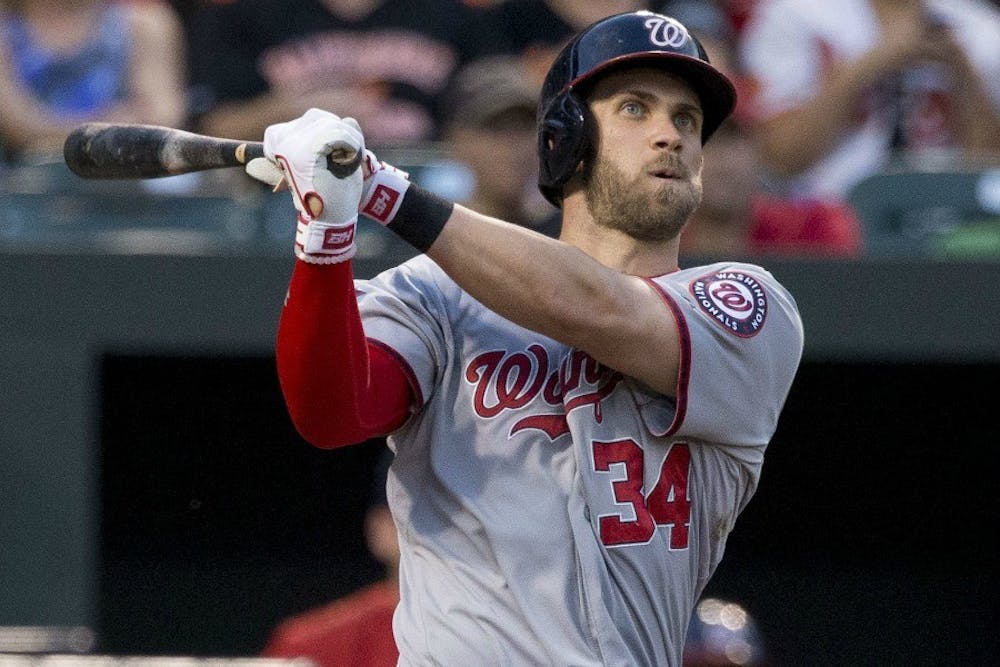I'm still intrigued four months later.
A star athlete, not just in Major League Baseball but in all of sports, was squatting near the floor, trying to reach the eye level of a boy around 10 years old.
Bryce Harper - the prodigy Sports Illustrated dubbed the "Chosen One" when he was 16 years old; the 2012 National League Rookie of the Year, 2015 NL MVP and three-time All Star; the idol of young aspiring athletes and the heartthrob of high-school girls - was listening to the ramblings of a child at the front of the Washington Nationals press conference room.
During the season, Harper frequently connected with children through Harper's Heroes, a Leukemia and Lymphoma Society program that invites children suffering from cancer to Washington Nationals games.
This gathering was July 20. Media members aren't supposed to be around during Harper's Heroes meetings, but my production crew had to feed some content back to the TV station, and the media room was the only place available.
I quietly stood in the back and observed.
Harper wasn't like this in the clubhouse. He didn't go out of his way to be nice.
Max Scherzer laughed and smiled with the media members. Dan Uggla thanked me and my photographer for an interview before he left the clubhouse one night.
If Clint Robinson, Drew Storen or Jordan Zimmerman didn't like a reporter's question, they'd politely find a way around it.
But Harper didn't care what anyone thought. Sure, he was a master in coach-speak, but he wasn't afraid to be blunt.
To avoid reporters, he'd sit on the far end of the clubhouse - the section where media members are forbidden - and play video games with Jayson Werth and Ian Desmond.
The first time I talked to Harper was after the Nationals' 2-0 win against the Toronto Blue Jays on June 2.
Two days before, Washington suffered a three-game sweep to the Cincinnati Reds. It halted the Nats' momentum after winning nine of their last 11 games, but they still topped the NL East.
"Bryce, after the setback with the Reds, what was the difference in today's game?" I said. "What did you and your teammates change from last week to this week in order to bounce back?"
He stared straight ahead over the sea of reporters swarming his locker.
"We're over that," he said. "We don't think about the past."
Shut down. A few of the reporters uncomfortably glanced at me.
I worked three more Nationals games, and none of my interactions with Harper were any less intimidating.
But my last day covering the team, July 20, is the memory that sticks with me.
The boy handed Harper a crinkled piece of printer paper. Sprawling handwriting covered more than half the page.
"Oh man, this guy's got a whole list here," Harper said with a chuckle.
He lifted the paper for the small group of families and children. "Do you guys see this?"
Harper ran through every question.
"Favorite TV show? That's a tough one. Right now, it's gotta be Orange is the New Black."
His crowd laughed. He continued giving genuine answers to each star-struck kid.
Harper looked each child in the eyes and engaged in conversations, regardless of how trivial the topic. He signed their countless hats, balls, jerseys, shirts, tickets, you name it - without a single sigh or roll of the eye. He obliged to individual pictures and group pictures.
Eventually, the public relations director alerted the group it was time for Harper to leave. Some children heaved an audible groan of disappointment.
Harper waved goodbye, thanked the families for coming and headed for the door. Before he could exit, a mother grabbed his arm.
"Just a picture please?" she pleaded.
Harper immediately jumped toward the woman's young son and put his muscled arm around the boy's shoulders. Both smiled for the camera.
It was as if Harper didn't want to leave.
The baseball star's self-appointed task - to bring back the popularity of MLB - is a big one. It fuels his desire to display his fiery confidence and punk attitude in order to achieve that.
But the real Harper, the one who exudes empathy and modesty when the cameras are turned away, is the Harper I'll remember.

